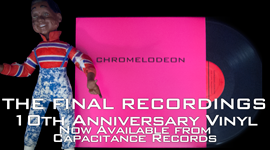Feature and review originally published in Amplifier issue #52, January-February 2006. Written by Brian Baker.
Chromelodeon
Those of us who came of age in the 1970s (and have the gray hair and memory lapses as proof) would never have bet the rent that progressive rook would experience a resurgence and reinvention in the new millennium. Once you’ve ingested monkey tranquilizers and gone coma at a Yes concert during “Bales of Psychotropic Doldrums” or whatever the hell they called that drivel, the sheen sort of peels off the genre.
Thankfully, there’s a new generation creating music that swells and soars with the same visceral energy that the best prog had to offer in the ’70s. A good many Of them, particularly Philadelphia’s Chromelodeon, are creating this new symphonic rock without the benefit (or onus) of being influenced by the genre’s forefathers. “We’re more of an epic instrumental thing,” says Chromeiodeon synthesist Ryan Soloby between teaching assignments in audio production as a graduate student at Temple University.
“We’re all obsessed with video games and that’s what really influences us. We didn’t set out to do video game music, but its almost inevitable.”
Chromelodeon began when its members were high school students, but the octet’s roots go back further. “It’s a classic case of almost growing up together,” says Soloby. It helps with the dynamics, because we’re unbelievably used to each other. There’s not really any surprises.”
Although the band’s members have been friends for over a decade in some cases, Chromelodeon came together under its current banner about four years ago, after testing material under a different name, and then doing a demo as Chromelodeon in 2001. Two years ago, the band released its compelling debut EP, In the Year 20XX, and they’ve recently followed up with Heart of Sawdust, a more streamlined execution of their musical vision. “The first one had vocoders and theremins and all kinds of stuff on it,” says Soloby.
Although any number of sonic parallels could be drawn with Chromelodeon (including Yes, King Crimson, Kansas, and Curved Air), Soloby’s credit to video soundtracks remains steadfast; the band has recorded an unreleased front-to-back cover of the Ninia Garden II music bed and Chromelodeon has been able to tour nationally through monetary sponsorship offered by the underground gaming/recording community. “We don’t have a huge national following, but everywhere we go there are always a couple of kids who have been waiting to see us for the longest time,” says Soloby.
For Heart of Sawdust, Chromelodeon stripped away as much excess as possible in an effort to approximate the band’s visceral projected-lights-and-video stage presentation.
“We also went for a slightly more live feel as opposed to a track-by-track layering. The way we recorded 20XX, with over-dubbing and overlaying, gave it this prog feel and that’s not what we really were going for. Heart of Sawdust has a more orchestral feel. People see us live, then head for the merchandise. The feedback we get is that they love it, but they love our live show more – which is a compliment, because so many times groups can’t play what they played on the album because of Autotune and overdubbing.”
In a similarly reductionist attempt to distance itself from the often imagery-dense prog perspective, the only titles that have been assigned to the songs on Heart of Sawdust are their corresponding track numbers, “One” through “Six.” “That came about because the songs were written before any context was applied to them,” says Soloby. “We felt like giving them titles after the fact wouldn’t do them any justice.”
As an instrumental outfit, Chromelodeon also deftly avoids the prog trap of having a showy singer performing bad conceptual poetry tarted up with overly dramatic music. It’s a pitfall of whitch the band is all too aware. “We’re trying to avoid that singular musician aspect,” says Soloby. “It’s always a part of a whole, not separated.”
Heart of Sawdust Review
On their 2004 debut, In the Year 20XX, Philly octet Chromelodeon showed themselves to be brilliant students of prog rock, extracting the passion and restraint and excising the overarching dramatics and unnecessary bombast of the form. With their sophomore release, Heart of Sawdust, Chromelodeon wisely follows suit with another succinct disc of orchestral rock delights. Once again eschewing the need for conceptually grandiose lyrics (epic storytelling is how most prog bands of the ’70s eventually disappeared up their own asses), the music is left to do its work. The band fills every available space with a virtual symphony of electronics and the standard paraphernalia of classic rock without the accompanying cliches. The songs on Heart of Sawdust avoid any implied meaning that could be found in actual titles, and are instead named numerically from “One” to “Six”. It’s a daring gambit, but in this vacuum of association, the soaring music is free to swirl around the listener’s conscious mind without the baggage of specious sword-and-sorcery contextualism to distract from the enjoyment of the music in its purest form. If the thought of prog rock leaves you cold, give Chromelodeon a fair shake; you’ll be surprised at just how punk their prog can get.







